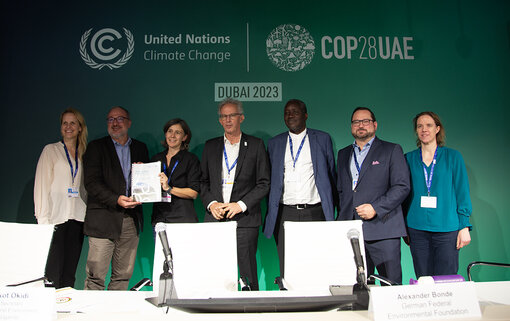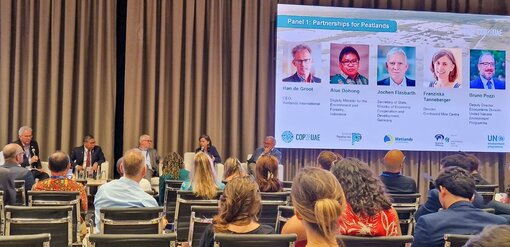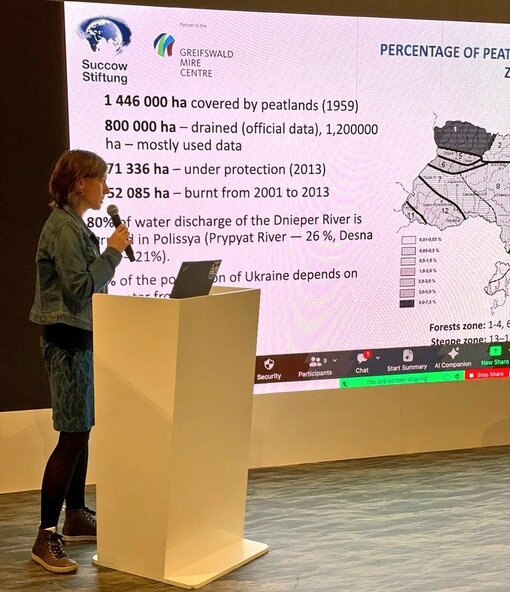The Succow Foundation, an official observer to the UNFCCC, played a pivotal role in spotlighting peatlands. In collaboration with our partners, we participated in numerous events over the past few days. On December 8th, we co-organized a panel titled ‘Towards a Global Stocktake for Peatlands and Other High-Carbon Ecosystems: Status and Scaling up Potential.’ This panel was a joint effort with the United Nations Environmental Programme (UNEP), United Nations Food and Agriculture Organisation (FAO), Wetlands International, and Deutsche Bundesstiftung Umwelt (DBU).
The panel underscored that the conservation, restoration, and sustainable management of peatlands are vital for achieving the climate goals set out in the Paris Agreement. Franziska Tanneberger from the Greifswald Mire Centre emphasized the scientific findings and recommendations of the Global Peatlands Assessment (GPA). She stressed the urgent need to conserve all natural peatlands, rewet all degraded peatlands, develop enhanced data systems, establish fair and transparent governance systems, and mobilize financing to protect and restore global peatlands swiftly and at scale. She poignantly noted that the carbon stored by peatlands could either be released or remain secured, and the choice lies with us, the people.
These objectives are endorsed by the 55 members of the Global Peatlands Initiative, launched in 2016, as highlighted by Bruno Pozzi from UNEP. The initiative lends direct support to five major tropical peatland countries, and international backing is crucial for successful on-the-ground implementation. Alexander Bonde, Secretary General of the German Federal Environmental Foundation, pointed out the significant role civil society can play in this regard.
Alfred Okot Okidi from Uganda’s Ministry of Water and Environment reported that peatlands have been incorporated into Uganda’s Nationally Determined Contributions concerning emission reductions and adaptation. Now, the focus is on raising public awareness about the value of peatlands. MSF is closely collaborating with Uganda to enhance the country’s peatland knowledge and capacity.
Next to making peatland knowledge easily accessible, Femke Tonneijck from Wetlands International particularly emphasized the need for reliable financing for peatland conservation and restoration. This conclusion was echoed by participants in the subsequent discussion, who shared their experiences from countries like Indonesia, Argentina, Russia, Canada, and Bangladesh, and at other peatland-related events at COP28.
On December 9th, we co-organized an official COP28 Presidency Event that explored ‘Enhancing Food and Nature Linkages for Climate Action.’ The speakers included Ani Dasgupta (President and CEO, World Resources Institute WRI), Alue Dohong (Minister of Environment and Forestry, Indonesia), Jochen Flasbarth (Secretary of State, Ministry of Economic Cooperation and Development, Germany), Bruno Pozzi (Deputy Director Ecosystems Division Director, UNEP), and Franziska Tanneberger. A key takeaway was that a paradigm shift to paludiculture (wet agriculture on peatlands) would yield benefits for the climate, biodiversity, water, and people. This can be achieved by improving peatland agriculture management, for instance, by focusing on crops better adapted to wet conditions.
Wrapping up on December 10th, a panel discussion titled ‘Nature-Based Solutions for Ukraine: From Theory to Practice - Forest and Water’ was held at the Ukrainian Pavilion. Naturally, the discussion included peatlands! Franziska Tanneberger showcased the ongoing efforts of the Succow Foundation, in collaboration with partners such as the Frankfurt Zoological Society and UNDP, to protect and restore the Polisia peatlands in Northern Ukraine.
Ukraine has set an ambitious goal to reduce its GHG emissions by 65% by 2030. Wet peatlands play a crucial role in this endeavour as they can alleviate water stress, prevent wildfires, and reduce GHG emissions. Interestingly, they also contribute to the defence of the country’s borders. The discussion underscored the importance of these natural resources in addressing both environmental and national security challenges.
Summing up the intense discussions about peatlands during COP28, we call for the urgent establishment of a global ‘Peatland Push’ as a follow-up to recent global initiatives like the Mangrove Breakthrough and the Freshwater Challenge.
![[Translate to EN:] Banner Stiftung](/fileadmin/_processed_/b/c/csm_banner-stiftung_fee6c1c492.jpg)


